Club trophies
Zenit are one of the most successful clubs in Russia. The blue-white-sky blues have won a large number of titles and trophies of the highest order in both domestic and international competitions.
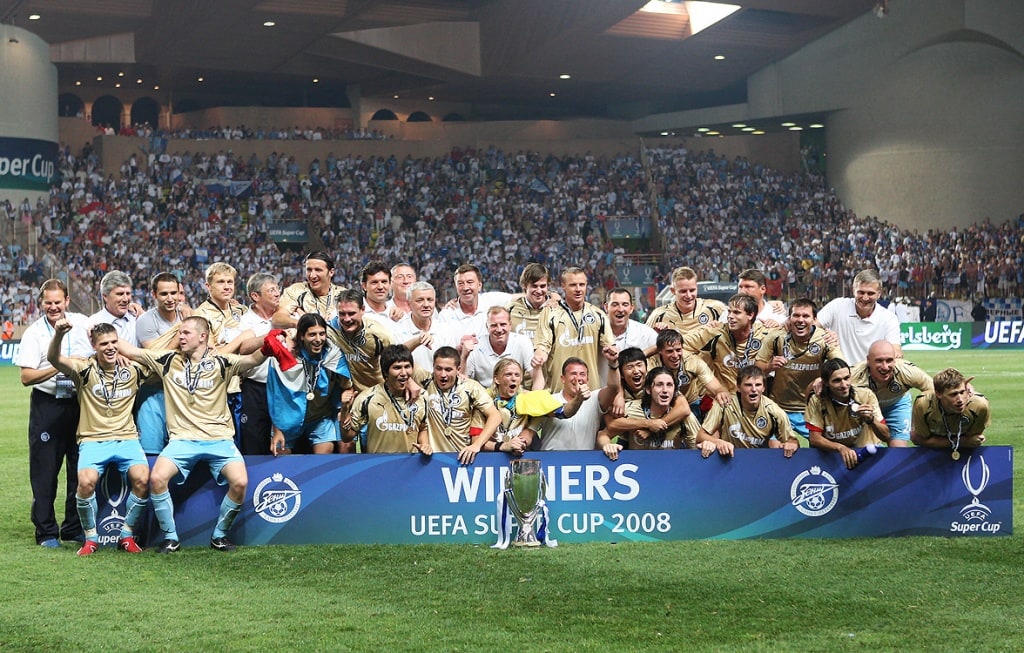
The club’s football glory comes both from trophies won by the team and from awards won by individual players. Awards given by football organizations, football specialists and journalists often underline the quality of play of the team as a whole and of our individual's football talents.
Zenit's trophy room includes:
Domestic Trophies
Soviet Top League / Russian Premier League Champions (6): 1984, 2007, 2010, 2011-12, 2014/15, 2018/19, 2019/20, 2020/21, 2021/22, 2022/23.
League Runners-up (3): 2003, 2012/13, 2013/14.
Soviet Cup / Russian Cup Winners (4): 1944, 1999/99, 2009/10, 2015/16, 2019/20.
Cup Runners-up (3): 1939, 1984, 2001/02.
Soviet Super Cup / Russian Super Cup Winners (5): 1984, 2008, 2011, 2015, 2016, 2020, 2021, 2022, 2023.
Super Cup Runners-up (3): 2012, 2013, 2019.
USSR Federation Cup / Russian Premier League Cup Champions: 2003.
Federations Cup Runners-up: 1986.
Progress Cup Champions: 1980.
International Trophies
UEFA Cup Winners: 2007-08.
UEFA Super Cup Winners: 2008.
UEFA Intertoto Cup Runners-up: 2000.
All awards of Zenit football club
1931
3rd place in the Leningrad Championship
1935
Finalist of the All-Soviet Cup of Trade Unions
1939
USSR Cup finalist
1944
Winner of the USSR Cup
1950
No.1 in the list of 33 best players of the season – L. Ivanov
1951
No.1 in the list of 33 best players of the season – L. Ivanov
1958
3rd place in the tournament of reserve teams
Winner of the “Work” prize for “Best Union Team of the Year”
1962
No.1 in the list of 33 best players of the season – S. Zavidonov
1964
Winner of the silver cup of the “Tournament of Four” (Florence, Italy)
Winner of the prize “Young Player of the Year” – V.. Gorbunov
1965
No.1 in the list of 33 best players of the season – V. Danilov
1966
No.1 in the list of 33 best players of the season – V. Danilov
Winner of the prize “Young Player of the Year” – V. Naumov
1970
Winner of the prize “Young Player of the Year” – Yu. Zagumennykh
1974
Winner of the Cup D’Aro (Italy)
1975
Winner of the prize “Young Player of the Year” – A. Redkous
1976
Winner of the “Nedeli” international mini-football tournament
Winner of the "Large Account" award for winning matches by three or more goals
1976 (о)
Winner of the award for “Top Goal Scorer” - A. Markin
Winner of the G. Fedotov prize for best team progress in the season
1980
Third place in the USSR championship
Winner of the “Progress Cup”
1981
3rd place of the tournament of reserve teams
1982
Winner of the 1st tournament of sister cities
1983
Winner of the 2nd tournament of sister cities
1984
USSR Champion
USSR Cup finalist
Winner of the 3rd tournament of sister cities
Winner of the “Large Account” award for winning matches by three or more goals
Winner of the “Goalkeeper of the Year” award - M. Biryukov
Winner of the G. Fedotov prize for the best team result
Winner of the award for “Greatest Goal Difference"
No.1 in the list of 33 best players of the season – M. Biryukov
1985
Finalist of the USSR Federation Cup
Winner of the USSR Super Cup – Season’s Cup
Winner of the 4th tournament of sister cities
1986
Winner of the 5th tournament of sister cities
1987
Winner of the 6th tournament of sister cities
1989
Winner of the 7th tournament of sister cities
1995
3rd place in Russia’s First Division
1996
Winner of the V. Zhmelkova prize – R. Berezovsky
1997
Finalist of the Astra Cup (Germany)
Winner of the prize “Strelets – Best Foreign Player” - R. Berezovsky
Winner of the prize “Strelets – Best Goalkeeper” - R. Berezovsky
Winner of the Second Wind prize - A. Davydov
1999
Russian Cup winner
Winner of the prize “Strelets – Best Striker” – A. Panov
No.1 in the list of 33 best players of the season – A. Panov
2001
Third place in the Russian Championship
Third place in the tournament of reserve teams
Winner of the Fair Play award
Winner of the prize “Strelets – Best Coach” – Y. Morozov
Winner of the prize “Strelets – Best Club President” – V. Mutko
Winner of the “Club Loyalty” prize – A. Igonin
2002
Russian Cup finalist
Second place in the tournament of reserve teams
Winner of the Fair Play award
Winner of the prize “Strelets – Best Striker” – A. Kerzhakov
Winner of the prize “Top Five – Best Junior Player” – A. Kerzhakov
No.1 in the list of 33 best players of the season – A. Kerzhakov
2003
Second place in the Russian Premier League
Winner of the Premier League Cup
Winner of the “Best Goalkeeper” award – V. Malafeyev
Winner of the “Knight of the Attack” award – A. Arshavin
Winner of the prize “Strelets – Best Striker” – A. Kerzhakov
Winner of the prize “Strelets – Hope of the Season” – V. Bystrov
Winner of the prize “Top Five – Best Junior Player” – V. Bystrov
No.1 in the list of 33 best players of the season – A. Kerzhakov
2004
Winner of the prize “Best Marksman in the Championship” – A. Kerzhakov
Winner of the G. Fedotov prize for best team progress in the season
Winner of the “Best Goalkeeper” award (Russian Footballers Union version) – V. Malafeyev
Winner of the title “Gentleman of the Year” – A. Kerzhakov
No.1 in the list of 33 best players of the season – A. Kerzhakov
No.1 in the list of 33 best players of the season – V. Malafeyev
No.1 in the list of 33 best players of the season – V. Bystrov
2005
Marbella Cup winner (Spain)
3rd place in the Russian Youth League
Winner of the “Large Account” award for winning matches by three or more goals
Winner of the “Knight of the Attack” award – A. Arshavin
No.1 in the list of 33 best players of the season – A. Arshavin
2006
Winner of the “Footballer of the Year” award – A. Arshavin
Winner of the “Best Goalkeeper” award (Russian Footballers Union version) – V. Malafeyev
No.1 in the list of 33 best players of the season – A. Arshavin
2007
Russian Premier League champions
Winner of the G. Fedotov prize for best team progress in the season
Winner of the “Hunger for Victory” award
Winner of the “Large Account” award for winning matches by three or more goals
Winner of the “Footballer of the Year” award – K. Zyryanov
Winner of the “Best Goalkeeper” award – V. Malafeyev
Winner of the prize “Best Footballer in the CIS and Baltic Countries” – A. Arshavin
Winner of the title “Gentleman of the Year” – K. Zyryanov
No.1 in the list of 33 best players of the season – K. Zyryanov
No.1 in the list of 33 best players of the season – A. Arshavin
No.1 in the list of 33 best players of the season – A. Timoshuk
2008
UEFA Cup winners
Winner of the prize “UEFA Cup Top Scorer” – P. Pogrebnyak
UEFA Super Cup winners
Russian Super Cup winners
”Team of the Year” award
Winner of the G. Fedotov prize for best team progress in the season
Winner of the “Large Account” award for winning matches by three or more goals
Winner of the “Coach of the Year” award (Russian Footballers’ Union version) – D. Advocaat
Winner of the prize “Best Footballer in the CIS and Baltic Countries – A. Arshavin
No. 1 in the list of 33 best players of the season – A. Arshavin
No.1 in the list of 33 best players of the season – A. Anyukov
No.1 in the list of 33 best players of the season – M. Danny
No.1 in the list of 33 best players of the season – R. Sirl
No.1 in the list of 33 best players of the season – A. Timoshuk
2009
Third place in the Russian Premier League
Russian Youth League Champions
No.1 in the list of 33 best players of the season – A. Anyukov
No.1 in the list of 33 best players of the season – V. Bystrov
No.1 in the list of 33 best players of the season – K. Zyryanov
Top scorer in the Russian Youth League – P. Ignatovich
2010
Winner of the Russian Cup
Russian Premier League champions
Zenit-Y third place in the Russian Youth League
2011
Winner of the Russian Super Cup
2012
Russian Premier League champions/p>
Winner of the award for "Team of the Season" (Russian Football Union)/p>
No.1 in the list of 33 best players of the season - V. Malafeev, A. Anyukov, N. Lombaerts, D. Criscito, I. Denisov, R. Shirokov, A. Kerzhakov./p>
No.2 in the list of 33 best players of the season - T. Hubocan, Danny/p>
Award for "Coach of the Season" (Russian Football Union)- L. Spalletti/p>
Award for "Player of the Seaon" (Russian Football Union) - I. Denisov/p>
Award for "Goalkeeper of the Season" (Ogonyok magazine) - V. Malafeev/p>
Award for "Foreign Player of the Season" (Russian Football Union) - N. Lombaerts/p>
Award for "Most Valuable Player" (Russian Football Union) - R. Shirokov
2013/14
Russian Premier League runners-up
№1 in the list of 33 best players of the season - Hulk, R. Shirokov, Danny
№2 in the list of 33 best players of the season - Y. Lodygin2014/15
Russian Premier League winners
RFU Best team of the season
No. 1 in the list of 33 best players of the season - E. Garay, N. Lombaerts, D. Criscito, O. Shatov, Danny, Hulk
№2 in the list of 33 best players of the season - Y. Lodygin, I. Smolnikov, J. Garcia, S. Rondon
2015/16
Russian Premier League third place
Winner of the Russian Cup
Winner of the Russian Super Cup
№1 in the list of 33 best players of the season - I. Smolnikov, Hulk
№2 in the list of 33 best players of the season - E. Garay, J. Garcia, A. Witsel, Y. Zhirkov, Danny, A. Dzyuba, O. Shatov
2018/19
Russian Premier League winners2019/20
Russian Premier League WinnersWinner of the Russian Cup
Russian Super Cup runners-up
2020/21
Winner of the Russian Super CupZenit are the only Russian football team to have won all the trophies of both the Soviet and Russian premier leagues. Zenit`s trophy room includes the League Championship, Cup, and Super Cup trophies of the USSR and Russia, as well as the Russian Premier League Cup.
USSR Cup 1944
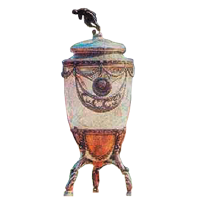
The first USSR Cup was held between the spring and autumn of the USSR Championships in 1936. The trophy was played for 51 times until 1992. The principle of holding the USSR Cup was simple, the tournament was open to all teams who wanted to take part in it. A draw was made for all those teams which applied, and matches took place under the Olympic system (the losing team is eliminated). Masters of sport were free from playing in the first round, and teams from the highest leagues participated in the tournament starting from the final rounds.
The fifth USSR Cup took place in July and August of 1944. On our way to the final Zenit won matches against Dinamo Moscow and Dinamo Baku (in fact Zenit beat Dinamo Moscow twice — first the reserve side, then the first team) and also beat the reigning champions at that time, Spartak Moscow. On 27th August in Dinamo stadium in Moscow, Zenit Leningrad, coached by Konstantin Lemeshev, won the Cup for the first time ever! Winning 2:1 against the most successful team of that time — CSKA. Zenit`s goals were scored by Boris Chuchelov and Sergey Salnikov. Having won the Soviet Union Cup in 1944, Zenit became the first team from outside of Moscow to win the trophy.
Zenit also twice lost the USSR Cup final, in 1939 and 1984.
USSR Championship 1984
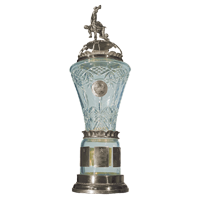
The USSR Championship was the top football league of the USSR from 1936 to 1991. At first the number of teams and the length of the season varied. With time the championship took its true form, and acquired its own rules and traditions. For example, the official anthem of the championship was the “Football March” written by Matvey Blantner. The USSR championship ceased to exist after the collapse of the Soviet Union .
The 47th USSR Championship was played from 10th March to 24th November 1984. On the last day of the season, on 21st November Zenit Leningrad, coached by Pavel Sadyrin, defeated Metallist Kharkov 4:1 and became USSR champions for the first time ever! Zenit`s goals were scored by Nikolay Larionov, Yury Zheludkov with two goals from Sergey Dmitriev. The match was refereed by Valery Butenko, the best Soviet referee. The historic match was hosted on tv by Nikolai Ozerov.
Zenit never came second in the USSR Championship, but came third in 1980 under head coach Yury Morozov.
USSR Season Cup 1985
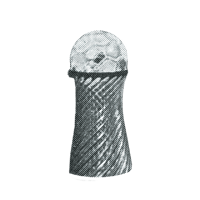
The USSR Super Cup, or the Season Cup, was a club tournament played in the USSR starting from 1977. The Cup was established by the editorial board of Komsomolskaya Pravda. The Season Cup was played between the winner of the USSR Cup and the champion of the country. The tournament was not held every year, but managed to gain the status of being the third most-important trophy in the USSR.
Zenit, the champions at that time of the USSR, played on 30th July and 5th August 1985 againt Dynamo Moscow, the winner of the USSR Cup. Zenit confirmed its title as USSR champion in this match, while also getting revenge for its Cup final loss. The Leningrad squad coached by Pavel Sadyrin beat Dynamo 2:1 in the first match (Zenit`s goals were scored by Yury Gerasimov and Vyacheslav Melnikov). The return leg was also won by Zenit, 1:0 with an own goal from Dynamo Moscow.
Russian Cup 1999
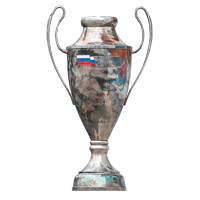
The Russian Cup was established in 1992. This is an annual competition for Russian football clubs held by the Russian Football Union, the Professional Football League and the Russian Premier League. Professional football teams as well as amateur football teams who are the winners of regional amateur competitions and which pass RPFL accreditation can take part in the Russian Cup.
The Russian Cup is a circulating prize. The winning club keeps the original trophy for one year, after which it receives a copy. The current trophy is already the second overall. From 1992 to 2000 the winning team was given a silver cup, while starting from the 2001 season the winner receives a crystal cup which is an exact copy of the USSR Cup. If a team wins the Cup three times in a row or five times altogether, then it keeps the trophy forever.
Zenit played Dinamo Moscow in the Russian Cup final on 26th May 1999 at the Luzhniki Stadium, Moscow. The head coach of the Petersburg side at that time was Anatoly Davydov, a former Zenit player who had recently retired from playing. Zenit won the final and became the first non-Moscow side to win the Russian Cup, thereby repeating its similar achievement from 1944. Alexander Panov scored a brace against the Moscow team (in fact the two goals were scored just a minute apart) and Roman Maksimyuk got the other goal.
Zenit reached the Russian Cup final again in 2002, but this time Yury Morozov`s team could not repeat its success from three years earlier.
Premier League Cup 2003
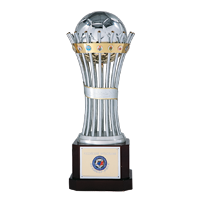
The Russian Premier League Cup is a football competition that was organized by the Russian Football Premier League. This Cup was held for the first and only time so far in the 2003 season. The competition included all 16 teams of the Premier League. The Cup was played using the European Olympic system, with the losers leaving the Cup. The teams played both a home and away game in each round.
The final of the first RFPL Cup took place on 9th September and 9th October 2003 between Zenit and Chernomerets Novorossiysk . The first match was held at the Petrovsky Stadium in St. Petersburg and was won 3:0 by Zenit. Zenit`s goals were scored by Andrey Nikolaev, Konstantin Konoplyov, and Vladimir Bystrov. Zenit won a comfortable victory even though we played almost the whole match with only ten men. Zenit`s goalkeeper, Sergey Ivanov, was sent off in the 13th minute. The return match in Novorossiysk ended 2:2. Zenit`s goals were scored by Vladislav Radimov and Lukas Gartig. The aggregate score of 5:2 meant our team are the holder of the Russian Football Premier League Cup.
Russian Premier League 2007, 2010, 2011/12, 2014/15, 2018/19, 2019/20
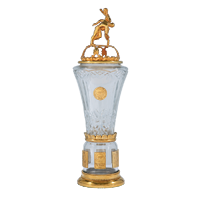


The Russian Premier League is the highest division of Russian football. There are 16 clubs in the League and the season is split into two halves with 15 matches either side of a winter break. After each season the teams which came in the two last places in the tournament table are relegated to the first division, while their two places are taken by the two best teams of Russia`s first division.
The Premier League trophy has been an exact copy of the Soviet Union Cup since 2001. The trophy is held by the champion throughout the following season, after which the team receives a duplicate trophy which is 4/5 the size of the original.
Zenit won the Russian Premier League for the first time in its history on 11th November 2007, in a match in vs. FC Saturn in Ramensk, near to Moscow. The only goal of the match came from Radek Sirl, while the heroes at the end were Vyacheslav Malafeev, who made an incredible reflex save, and Alejandro Domingues, who cleared the ball right off the Blue-White-Sky Blues` goal line in the last seconds of the match. Dick Advocaat, who led the team to its first ever Russian championship, became the first-ever foreign coach to take a team to victory in the Russian championship.
Zenit won the Russian Premier League for the second time in the 2010 season under head coach Luciano Spalletti. Zenit led the Premier League for most of the season and officially sealed the title two weeks before the end of the season, at home vs. Rostov.
Zenit made it back-to-back Russian Premier League titles in the extended 2011/2012 season, which lasted one and a half years. Zenit trailed CSKA in the league for most of the first half of the season, but when Domenico Criscito joined the team in July, he assisted Alexander Kerzhakov in his debut in a 2:0 away win over CSKA. Zenit never looked back and won the title by 13 points. The title match came on 28th April when Zenit beat Dynamo Moscow 2:1 at home thanks to goals by Roman Shirokov and Alexander Kerzhakov.
Russian Super Cup 2008, 2011, 2015, 2016, 2020
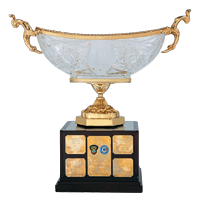

The Russian Super Cup is a one-match tournament which begins the Russian football season. The tournament features the winner of the Russian Premier League and the winner of the Russian Cup (if the Premier League winner and the Cup winner are one and the same team, then the first and second-place Premier League teams from the previous year play). The Super Cup was played for the first time in 2003. The Russian Super Cup can be kept either by the team that wins the trophy three times in a row, or five teams overall. The team holds the trophy for a year, after which the original is replaced by a copy.
Zenit won the trophy on 9th March 2008, winning in the Luzhniki Stadium in Moscow. Zenit beat Lokomotiv Moscow in the presence of 50,000 spectators, of which more than a half were supporters of the blue-white-sky blues. Our team`s supporters saw goals by Andrey Arshavin in the 39th minute and Pavel Pogrebnyak in the 82nd minute.
Zenit won the Russian Super Cup for the second time on 6th March at the Kuban Stadium in Krasnodar. This was the first time the Russian Super Cup was ever held outside of Moscow. Zenit beat CSKA in the match by a goal from Alexey Ionov and created by Sergey Semak in the 73rd minute. Zenit thereby did the treble and held the Russian Premier League title, the Russian Cup, and the Russian Super Cup all at the same time for the first time in its history.
Russian Cup 1998/99, 2009/10, 2015/16, 2019/20
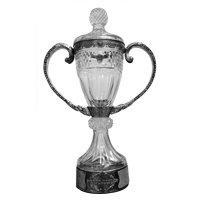
Zenit won the Russian Cup for the second time in its history in 2010. Zenit became the first team to win the newly-designed cup, the first team to win the Cup in a final held outside of Moscow and the first non-Moscow team to win the Russian Cup twice.
The new Russian Cup was crafted at the Dyatkovsky Crystal Plant. The silver part of the cup was made by the Gorod N jewelry company. The total weight of the crystal cup is about 17 kilograms and it cost about 3 million rubles to make.
The final match of the 2009/10 Russian Cup took place on 16th May 2010 at the Olymp-2 stadium in Rostov-on-Don. Zenit beat Sibir Novosibirsk 1:0. The winning goal was scored from the penalty spot by Roman Shirokov. More than 7,000 Zenit supporters came from St. Petersburg to the southern Russian city of Rostov-on-Don to cheer for their team.
UEFA Cup
This tournament has existed since 1955, and earlier was called the Inter-Cities Fairs Cup.
The UEFA Cup is made in Italy by the design of the Swiss designer Alex Diggelman. The height of the silver cup is 65 cm, with a diameter of 33 cm and a weight of 15 kg. The cup of the trophy holds 50 liters, however it can`t be filled with champagne because it`s not sealed.
Zenit won the UEFA Cup trophy in 2007/08. Zenit won the match on goals by Igor Denisov and Konstantin Zyryanov against the Scottish club Rangers. It was Zenit`s first-ever European trophy.
UEFA Super Cup
This one-match tournament has been played since 1973, and determines the strongest team out of the winners of the two main UEFA tournaments: the Champions League and the UEFA Cup.
The trophy itself is a cup 58 cm in height and 12.2 kg in weight. This cup is the second in the history of the tournament. Until 2006 the Cup was a trophy 42.5 centimeters in height.
The UEFA Super Cup was won by Zenit in Monaco, where the winner of the 2007/08 UEFA Cup played with Manchester United, which won the 2007/08 Champions League. Zenit`s goals were scored by Pavel Pogrebnyak and Miguel Danny. Dick Advocaat`s team was the first in the history of Russia to win the trophy.
Journey of the Cups
42 cities
Zenit`s European trophies were taken to 42 cities both in Russia and outside the country.
Four trips around the equator
Altogether the Zenit cups traveled – 151 086 kilometers. If the Cups had traveled around the earth`s equator, they would have gone around the world almost 4 times. The longest trip taken by the Cups was– 18,000 kilometers to Vladivostok and back.
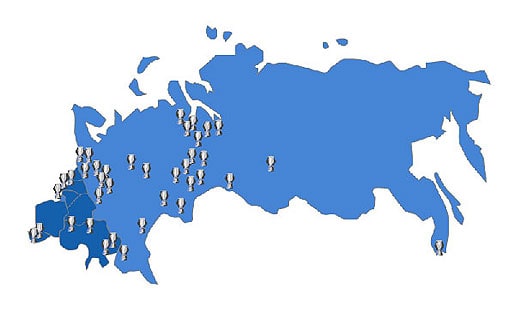
Cups and fans
From Vladivostok to Prague
Zenit showed its European trophies to fans in St. Petersburg, Moscow, Omsk, Smolensk, Muravlenko, Kholm-Zhirkovskogo, Noyabrsk, Pskov, Tyumen, Samara, Tarko-Sale, Ulyanovsk, Purpe, Salekharda, Prague, Tolyatti, Rudno, Kaliningrad, Kiev, Tomsk, Donetsk, Khanti-Mansiisk, Lutsk, Astrakhan, Lugansk, Perm, Riga, Orenburg, Jurmala, Nadym, Vyborg, Krasondar, Kingisepp, Surgut, Kirishi, Nizhny Novgorod, Lodeinnoe Pole, Veliky Novgorod, Pushkin, Valdai, Pavlovsk, Rzhev, and Vladivostok.
Half a million photographs
The UEFA Cup and Super Cup were taken to cities whose total number of inhabitants exceeds 30 million people. This is more people than the entire population of such countries as Holland, Romania, Venezuela, and Canada. The Cups were shown to fans more than 150 times. Altogether about 500,000 people had the opportunity to be photographed along with the Cups.
Personal awards
At the end of each season, representatives of official football organizations and the mass media give footballers special prizes for their achievements which aren’t recognized by the league itself. This might be prizes for the greatest number of goals scored by a team or by a player, greatest goal difference, the number of blowouts, or greatest number of cards received by a player. Awards can also be given for fair or clean play, or for the best player, either on the field or in the goal.
Zenit has won more than 30 such trophies, and won awards even in those years when the team didn’t play well as a whole. The blue-white-light blues have always had players who captured the attention of specialists and fans around the country.
33 best
The list of 33 best is a list of the best players of the Russian Championship. This list is prepared each year and approved by the Executive Committee of the Russian Football Union (earlier — of the Championship of the Soviet Union). This list is made up of three symbolic teams of footballers (№ 1, № 2 and № 3), which are distributed by their position on the field: 1 goalkeeper; 4 defenders (one right back, two center backs, one left back); 4 halfbacks (a right halfback, two central halfbacks, and one left halfback); and 2 forwards (a left forward and a right forward). Sometimes the positions of the pairs of central defenders and halfbacks changed (for example, in 2002 the central defenders were a libero and a stopper, while the halfbacks were a central halfback and a “halfback-striker”).
Zenit players who made the first team of the best 33 players include L. Ivanov (1950, 1951, 1952), S. Zavidonov (1962), V. Danilov (1965, 1966), A. Panov (1999, 2000); А. Kerzhakov (2002, 2003, 2004), V. Bystrov (2004), V. Malafeyev (2004), A. Arshavin (2005, 2006, 2007, 2008), A. Timoshuk (2007, 2008), K. Zyryanov (2007), A. Anyukov (2008), R. Sirl (2008), and M. Danny (2008).
“Strelets” award
The “Strelets” award was the top individual award given in Russian football from 1997 to 2003. The award got its name in honor of Eduard Streltsov, the legendary Soviet footballer who wasa a forward for the Soviet national team.
Awards for the best goalkeeper, defenders, halfbacks, strikers and coaches were given based on the results of a survey of all head coaches in the highest division in the country, as well as assistant coaches and coaches of the national team.
“Stelets” statues were won by the following Zenit players in various years: Roman Berezovsky (best goalkeeper and best foreign player, 1997), Yury Morozov (best coach, 2001), Vitaly Mutko (best club president, 2001), Alexander Kerzhakov (best striker, 2002, 2003), Vladimir Bystrov (rookie of the year, 2003).
Player/Coach of the Year
The “Player of the Year” (and “Coach of the Year”) awards are given by the Russian Football Union at the final ceremonial evening of each season to the best player (and coach) of that year in the opinion of the Russian Football Union.
The Player of the Year awards were given to the Zenit players Andrey Arshavin and Konstantin Zyryanov in 2006 and 2007, respectively, while Dick Advocaat was named coach of the year in 2008.
Gentleman of the Year
The “Fair Play” award with the official presentation of the “Gentleman of the Year” tuxedo is officially viewed by the Russian Football Union to be the second-most important football prize in Russia after the “Player of the Year” award. The “Gentleman of the Year” award was recognized by the FAIR PLAY international federation. The prize was established in 1994 and carries the name of the first holder of the tuxedo, the legendary Soviet-Russian footballer Fyodor Cherenkov. The Zenit player Alexander Kerzhakov won the award in 2004, while in 2007 the award was won by Konstantin Zyryanov.
Goalkeeper of the Year
The idea of this prize was started by “Ogonyok” magazine in 1960, right after the USSR national side won its first European Championship. The Goalkeeper of the Year award was one of the first honorable awards of Soviet football. Today the award, which is now named in honor of Lev Yashin, remains one of the most respected awards of Russian football. The prize is given to the best goalkeeper at the end of the season.
Ogonyok magazine traditionally chooses the winner of the Lev Yashin award. Nowadays the award is given based on the results of voting on the Ogonyok web-site. The voting is held throughout the football season. At the end of the season Ogonyok forwards the three winners from the web-site to specialists who choose the best of the three.
The Goalkeeper of the Year award was given in 1984 to Mikhail Biryukov. The Zenit goalkeeper Vyacheslav Malafeyev won the award in 2003 and 2007.
Top Five
The Top Five is a national ward in Russian football given by a coalition of the Russian Football Union (RFU), the Children’s Football League (CFL) and the Lukoil sport club to the best premier league football player of the outgoing year.
The winners are chosen based on a survey of about 100 football and sports media representatives.
In 2002 this award was given to the Zenit player Alexander Kerzhakov, and a year later to Vladimir Bystrov.
Footballer of the Year
The Footballer of the Year award is given each year by mass media representatives to the best footballer of the season in Russia as determined by Sport-Express magazine (since 1991) and the weekly magazine “Football” (since 1964).
The “Sport-Express” winner is determined by the votes of coaches and players of Russian Premier League teams, while the “Football” magazine winner is determined by a survey of journalists from cities whose teams are represented in the main league of the country.
Both versions chose Andrey Arshavin as the player of the year in 2006, while Konstantin Zyryanov was chosen as the player of the year by both publications in 2007.
Rookies of the Year
The Rookies of the Year awards were established by the Smena magazine in 1964. This award was given to the 11 best new players of the year. This prize existed until 1975. Later, in 1986, the “Best Newcomer” award was established.
Zenit players were named Rookies of the Year four times. These included Viktor Gorbunov, in 1964, Vladimir Naumov in 1966, Yury Zagumennykh in 1970, and the striker Andrey Redkous in 1975.
Best Striker
The Best Striker award was established by the editorial board of the “Trud” (“Work”) newspaper in 1958, and was given to the most productive striker of the USSR Championship. This prize has been given to the best striker in the Russian League since 1991.
Alexander Markin won the award in the Soviet period, scoring 13 goals in 15 matches in the fall season in 1976. In the post-Soviet period, Alexander Kerzhakov won the award in the 2004 season, scoring 18 goals in the Russian Premier League.
Best Goal Difference
The prize for Best Goal Difference was established by the editorial board of the Ukrainian magazine “Start” in 1966. The prize was given to the team which had the best difference in goals scored and against in the USSR Championship. Zenit won the award in 1984.
Prize in the name of Grigory Fedotov
The prize in the name of Grigory Fedotov was established by CSKA in 1958 in honor of Grigory Fedotov, an excellent striker, and was given to the most productive team in the USSR Championship.
Zenit won the Grigory Fedotov prize three times — in 1976, 1984 and 2007.
Blowout prize
The “Blowout” prize was established by the editorial board of the weekly magazine “Football” in 1961. This prize was given to the team which won the most matches in the USSR Championship by three or more goals.
Zenit won the Blowout prize twice — in 1976 and 1984.
Progress Cup
The Progress Cup prize was established by the editorial board of the Kiev-based “Rabochaya Gazeta” (“Workers’ Newspaper”) in 1971. This prize was given to the team which achieved the greatest progress as compared to the previous season in the USSR Championship.
Zenit won the Progress Cup in 1980.